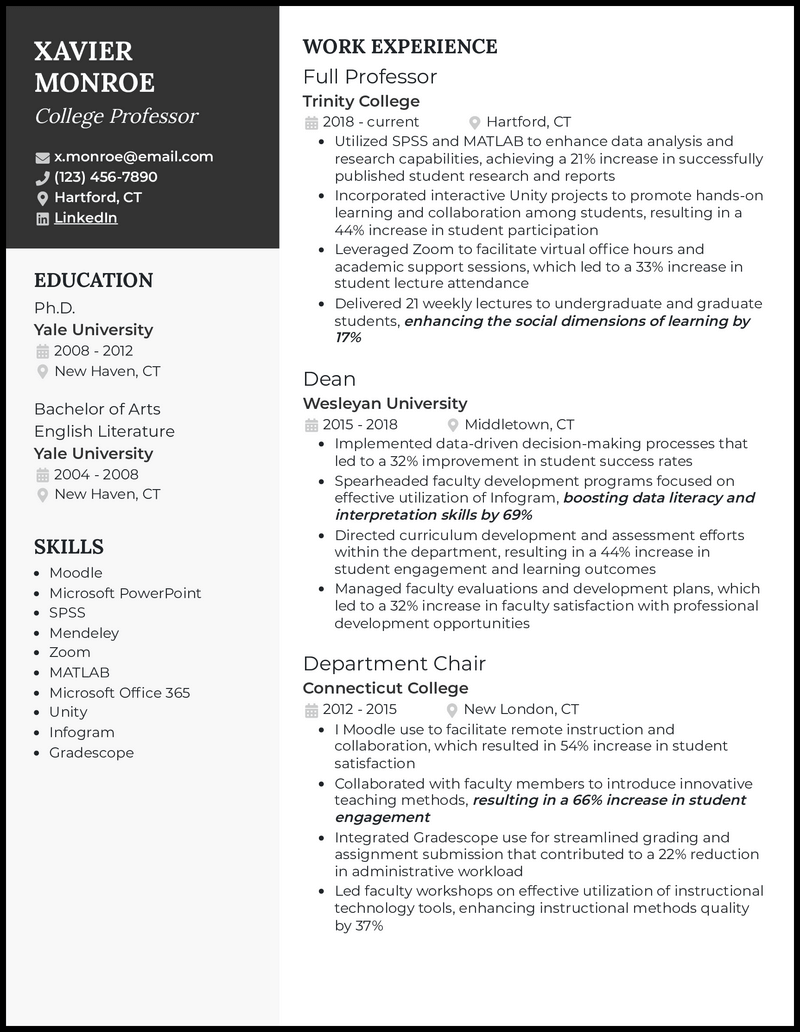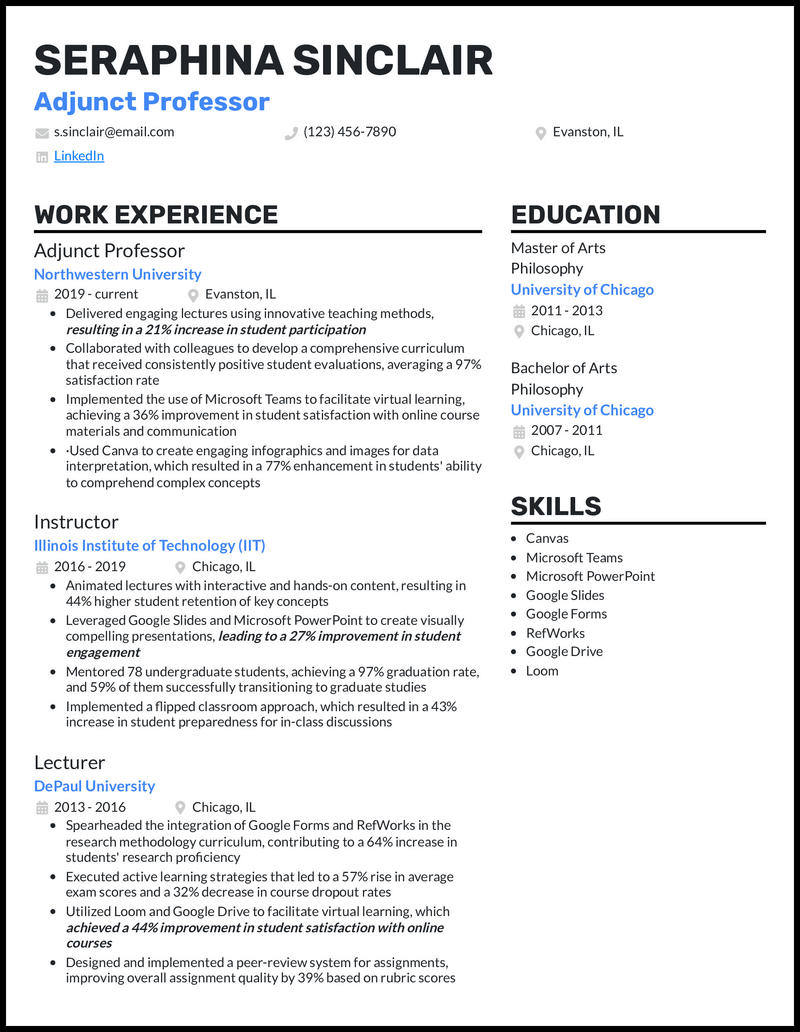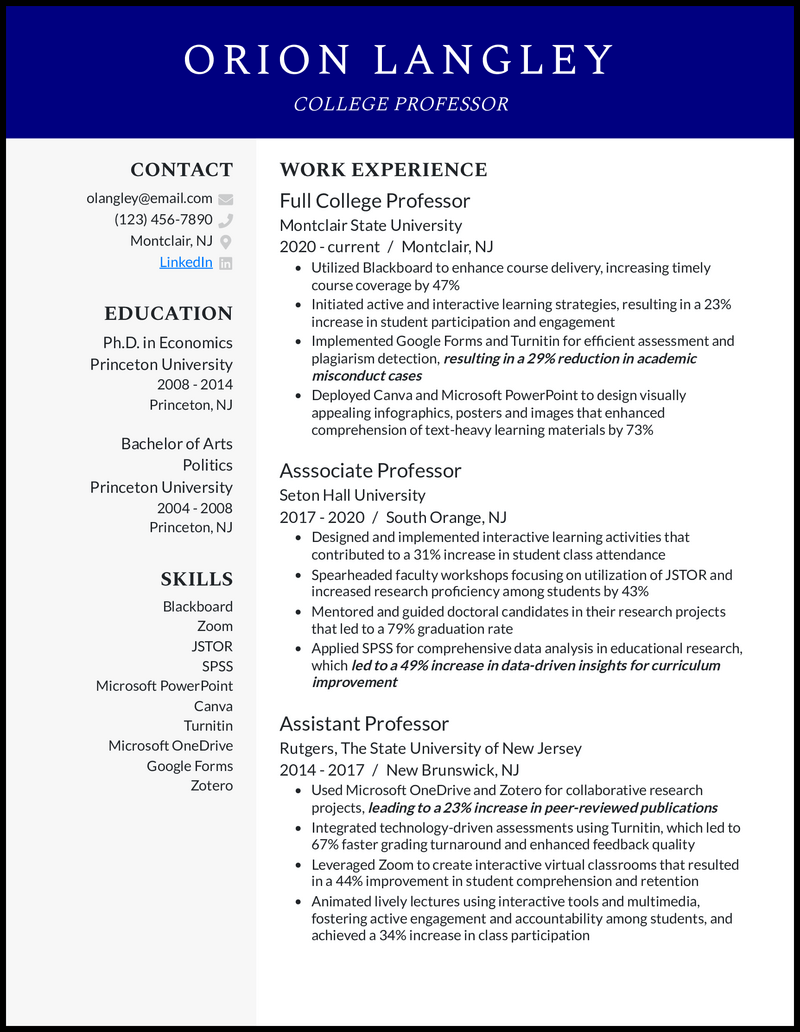As a professor, you’re the guiding light in the world of education. Your expertise illuminates the path for eager minds, fostering critical thinking and knowledge. Whether delivering captivating lectures, conducting groundbreaking research, or mentoring students, your impact is profound.
Your skill set includes not only subject matter expertise but also effective communication, adaptability, and a passion for learning. Crafting a resume that fully captures your role and unique contributions can be challenging. And it’s paramount to know that a lot of academia in the US requires a CV instead of a resume.
We know a bit about job applications, and we’re here to assist with our easy-to-follow resume tips and expert-written professor resume examples. And for the perfect application, try our free cover letter builder.
Why this resume works
- Clear expertise to work with different instructional tools to facilitate effective students’ learning is a must-have in your professor resume. Ensure to showcase how you leverage different tools and work with other staff for the best interest of the students and the rest of the departmental staff.
- The resume should also reflect your understanding and proficiency in classroom management, research program, and progress assessment.
Why this resume works
- Don’t limit your narrative to a detailed account of your duties and wins in previous positions, no matter how intriguing they may be. Backing up your claims with genuine numbers is necessary, if not mandatory.
- But what kind of metrics make sense for an assistant professor resume? You could mention the number of papers you published in top-tier journals or narrate increasing publication submissions by a specific percentage. Other worthy mentions here include boosting student performance scores by, say, 3 points and growing internship placements by, say, 100+ positions.
Why this resume works
- Given that recruiters take a few seconds to review application documents and determine a candidate’s suitability, your associate professor resume could greatly benefit from accentuated wins.
- It’s a matter of bolding, underlining, and/or italicizing a phrase per a group of bullet points to draw the hiring manager’s attention to those remarkable achievements you are proud of. Examples here include “contributing to publishing four peer-reviewed articles in top-tier journals” and “raising average exam scores from 54 to 76 out of 100”.
Why this resume works
- Have you tried blowing recruiters away by beefing up the education part of your English professor resume? You know, making it pop with your impressive foundational knowledge? It could tip the scale in your favor.
- When it’s about highlighting your education on a resume, the reverse chronological order is the way to go. Kick things off with your PhD and let your master’s and bachelor’s degrees follow closely. Deets like the institutions you attended, their locations, and graduation dates are an absolute must!
Why this resume works
- Hiring managers have only a few seconds to spare for your nursing professor resume, so make sure to catch their eye immediately by all means necessary. Bolding, underlining, or italicizing your most remarkable wins to grab their attention and showcase your value is our favorite tip for making your masterpiece rise above the pack.
- “Established and delivered 32 engaging online courses using Blackboard…”, “…enhancing crisis management skills for over 207 staff members”, and “…identifying four key areas for service improvement that led to a 27% increase in 5-star reviews in two months” make for good examples here.
Why this resume works
- Showing what more you can offer the students and the faculty outside of face-to-face lectures should always appear in your adjunct professor resume.
- In particular, highlight your experience preparing students for classes, supporting them to achieve their goals, and aiding them in their research and virtual classes, all while showcasing your mastery of innovative teaching methods.
Why this resume works
- Showing your proficiency in lecture preparation, management and student assessment, all while leveraging different pedagogical tools and software such as Blackboard, Zotero, Google Forms, Microsoft OneDrive, and Zoom, and more will give your college professor resume an upper hand in the shortlisting stage.
- And don’t just name-drop the tools, show how they assisted students’ learning and comprehension processes.
Related resume examples
Adjust Your Professor Resume Every Job Application

Crafting a compelling professor’s resume is all about showcasing your relevant skills and expertise, so begin by focusing on your academic and research skills. Mention your subject matter expertise, research methodologies, and any specialized software or tools you’re proficient in.
When it comes to picking your skills, be as specific as possible. Avoid vague terms like “passionate educator” and opt for specifics like “curriculum development,” “research supervision,” or “grant proposal writing.”
Soft skills, like effective communication, adaptability, and mentorship, can find a place on your resume, especially if they align with the job requirements. However, prioritize your academic and technical abilities. Save detailed discussions of your people skills for your work experience, where you can demonstrate how you’ve applied them in your academic career.
Need a few ideas?
15 top professor skills
- JSTOR
- Blackboard
- Google Workspace
- Moodle
- Microsoft Office
- ProQuest
- Specialized Knowledge
- Research Methodologies
- Public Speaking
- Mentoring
- Grant Proposals
- SPSS
- Matlab
- Gradescope
- Turnitin

Your professor work experience bullet points
Your work experience section is your chance to shine by highlighting your significant contributions and achievements. Instead of simply listing your daily responsibilities, focus on your proudest accomplishments and the impact you’ve had on students, academic programs, or institutions.
Think about the improvements you’ve made in the educational process, whether it’s enhancing curriculum, achieving higher student success rates, or securing research grants. Use metrics whenever possible to make your impact stand out even more.
For instance, you could mention the percentage increase in student engagement, the amount of research funding secured, or the number of successful graduate students you’ve mentored. Remember, your effectiveness as a professor is directly tied to the success of your students and the institution.
- Showcase your ability to attract external support for your work by sharing the amount of research funds you’ve secured.
- Quote the successes of your students with metrics like improved exam scores or increased student participation.
- Highlight your own successes by mentioning your number of publications, peer-reviewed articles, books, or conference papers.
- Show you get the job done by sharing high graduation rates for the students you’ve mentored in the past.
See what we mean?
- Utilized Blackboard to enhance course delivery, increasing timely course coverage by 47%
- Delivered engaging lectures using innovative teaching methods, resulting in a 21% increase in student participation
- Delivered 21 weekly lectures to undergraduate and graduate students, enhancing the social dimensions of learning by 17%
- Implemented data-driven decision-making processes that led to a 32% improvement in student success rates
9 active verbs to start your professor work experience bullet points
- Developed
- Enhanced
- Mentored
- Innovated
- Administered
- Collaborated
- Published
- Secured
- Presented
3 Tips for Writing a Professor Resume as a Beginner
- Leverage academic projects
- Luckily for you, your education is highly relevant when you’re applying for the role of professor. Just showcase any of your academic projects, research initiatives, or coursework pieces that are directly related to your field of expertise. In addition, discuss in detail any research papers you’ve authored, collaborations with professors, or significant contributions to group projects.
- Highlight relevant coursework and academic awards
- In the absence of extensive work experience, emphasize your academic achievements. Mention any academic awards, honors, or scholarships you’ve received. For instance, if you excelled in a specific subject or were recognized as a top-performing student in your department, be sure to mention it.
- Craft a strong career objective
- Begin your resume with a well-crafted career objective that succinctly communicates your passion for teaching and your commitment to academic excellence. Explain your academic aspirations, the specific field you want to teach in, and your dedication to fostering student success.
3 Tips for Writing an Experienced Professor Resume
- Highlight your academic specializations
- If you’re experienced in specific academic areas or disciplines, such as a specialization in neuroscience, early childhood education, or environmental science, ensure that this stands out on your resume. For example, if you’ve published extensively in a particular subfield or have received awards related to your specialization, emphasize this to show your deep knowledge in that area.
- Quantify your achievements and impact
- Always use metrics to quantify your accomplishments. Mention the number of students you’ve taught, the courses you’ve developed, or the research grants you’ve secured. Highlight any significant improvements in student success rates or program enhancements that you’ve led.
- Choose an appropriate resume template
- Select a resume template that reflects the academic field and position you’re applying for. Keep the formatting clean and professional, with clear headings and bullet points to keep various resume scanners happy. Prioritize content, focusing on your teaching and research experiences, skills, and certifications.
Concentrate on metrics that demonstrate your impact in academia. This could include student success rates, research publications, grant funding secured, or the number of courses you’ve developed.
Include any relevant certifications, such as a PGCHE or a certificate in online teaching. Additionally, mention any memberships in academic organizations or societies that are pertinent to your field.
Include a combination of academic skills (teaching, research, curriculum development) and any technical or transferable skills (data analysis, public speaking, project management) that are relevant to the position you’re applying for. Tailor your skills section to match the job requirements.












